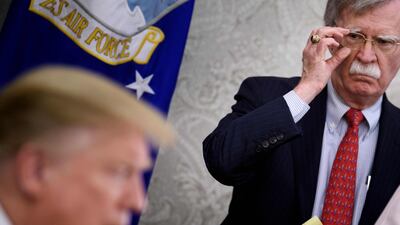The departure of John Bolton, US President Donald Trump's third national security adviser in as many years, was both inevitable and extremely instructive.
In Mr Trump's court, everyone goes, often sooner rather than later, except those within his nuclear family.
After his inauguration, Mr Trump appointed numerous senior officials with gravitas, experience and their own personal and professional standing independent of him. With the departure of Director of National Intelligence Daniel Coats last month, the last of the experienced professionals has now been purged.
The remaining team, many serving in unconfirmed and acting capacities, are all relatively junior and entirely dependent on the president for standing and authority. He doesn't like subordinates who have fixed ideas that don't readily bend to suit his ever-changing political agenda.
Mr Bolton had to go because, even though he was often willing to shelve his objections or allow himself to be pushed aside, the direction of the US administration's foreign policy as the 2020 election approaches was increasingly deviating from his militaristic and uber-hawkish views.
Mr Trump does not engage in policy at all. He only practices politics and – especially where foreign policy is concerned – he has few strong views or clear ideas.
His political challenge, however, is that he heads a Republican coalition that is deeply divided between hawks like Mr Bolton, whose ideas and attitudes were shaped during the Cold War and who are committed to a robust global profile and militarism, versus neo-isolationists like Kentucky senator Rand Paul, who advocate a low-profile mercantilist foreign policy that shuns intervention and global responsibilities.
Mr Trump has tended to oscillate between these two attitudes, depending on the politics of the moment.
Now, as the election begins to loom, the neo-isolationism that so strongly appeals to his base, and to many liberal and working-class Democrats, is gaining priority.
Mr Trump believes he was elected to end wars and he certainly doesn't want to be perceived as recklessly flirting with new ones going into the next election: hence the outreach to the Afghan Taliban, the Iranian regime and others.
Mr Bolton's perspectives didn't suit that agenda at all. Yet the former adviser was certainly willing to accommodate Mr Trump on many things for a long time.
He dutifully swallowed wholesale a series of capitulations to the North Korean dictatorship and allowed himself to be completely excluded from those conversations. He also kept quiet when Mr Trump ingratiated himself with Russian President Vladimir Putin, and repeatedly sided with Pyongyang and Moscow over various Americans, including his own intelligence services and other officials.
Three key disputes brought Mr Bolton down.
He committed the administration to supporting a planned coup in Venezuela that fell apart, enraging the president.
He was livid when Mr Trump called off a planned strike against Iran in retaliation for the downing of an unmanned US drone and opposed nay notion of easing sanctions to facilitate talks with Tehran.
Finally, he opposed plans for a summit meeting at Camp David with Taliban officials, which Mr Trump eventually abandoned himself.
It became increasingly clear that until the election, Mr Trump has little use for unreconstructed hawks like Mr Bolton, even when they are willing to be highly accommodating.
The impact of his departure isn't yet clear. North Korea despised him but there's no reason to think he was an effective impediment to those discussions.
The Iranian regime might take satisfaction in his departure but unless its leaders are interested in the summit that Mr Trump is proposing, and which Mr Bolton would probably have opposed, it is unlikely to do them much good. Indeed, it might even provoke Tehran to overreach if they miscalculate Mr Trump's aversion to conflict in the coming months.
Some of the impact will depend on Mr Bolton’s successor.
One initial idea, reportedly shelved, was for Secretary of State Mike Pompeo to take on that role as well, much as Henry Kissinger had in the 1970s. Mr Trump has said he is not considering Mr Pompeo, however, while Mr Pompeo shows signs of growing political ambitions back in Kansas.
The co-ordinator of Iran sanctions, Brian Hook, is reportedly under serious consideration. That would be the strongest possible signal that the sanctions campaign against Iran will continue to intensify.
The drone attacks on Saturday against Saudi oil facilities in Abqaiq and Khurais, claimed by the Houthi rebels, make any other scenario far more unlikely. No matter who was really responsible, Washington will have no choice but to view the attacks as another major escalation of Tehran’s “maximum resistance” campaign, meaning that Mr Bolton will be leaving with his hawkish attitude towards Iran seemingly vindicated.
It is also possible that a Trump loyalist like US ambassador to Germany Richard Grenell could be installed as a presidential surrogate.
In any event, US policy will be entirely dictated by Mr Trump’s political calculations and the challenge of navigating between Republican hawks and neo-isolationists.
The president has reportedly asked why he needs a chief of staff when he can do the job better. He virtually serves as his own press secretary. And, in effect, he will be his own national security adviser too.
Hussein Ibish is a senior resident scholar at the Arab Gulf States Institute in Washington


